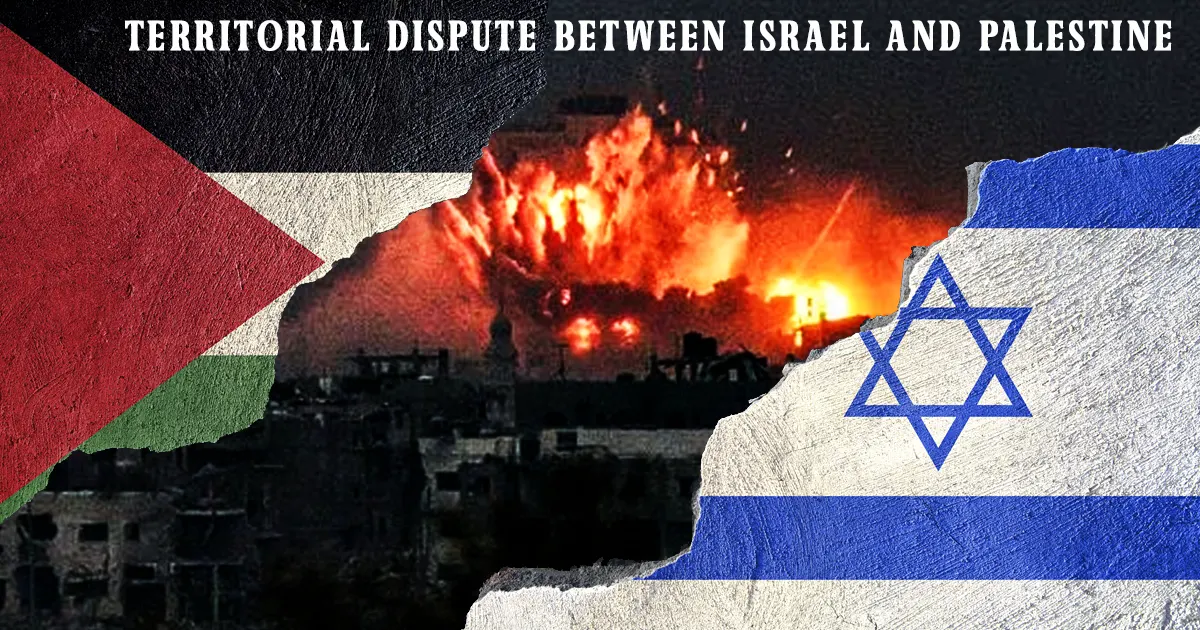GS 2 – International relation

The territorial dispute between Israel and Palestine centers on both claiming historical rights to the same areas, including Gaza, the West Bank, and Jerusalem. This conflict has led to the displacement of many Palestinians, creating a significant refugee population. Over the years, tensions have flared into violence, with incidents such as rocket attacks from Gaza, Israeli military operations, and clashes in the West Bank. These events have caused loss of life, widespread suffering, and severe damage to infrastructure on both sides.

Key Historical Events
- Balfour Declaration (1917):
- During World War I, British Foreign Secretary Arthur James Balfour issued a declaration supporting the establishment of a “national home for the Jewish people” in Palestine.
- This move was controversial as Palestine was predominantly Arab, leading to growing tensions between Jewish immigrants and the Arab population.
- UN Partition Plan (1947):
- After World War II and the Holocaust, international support for a Jewish state grew. The United Nations proposed a partition plan to create separate Jewish and Arab states, with Jerusalem under international administration.
- While Jewish leaders accepted the plan, most Arab nations and Palestinian leaders rejected it, viewing it as unfair and as a threat to their territorial integrity.
- Arab-Israeli War (1948):
- Following the declaration of the State of Israel in 1948, neighboring Arab states invaded Israel.
- Israel won the war and expanded its territory by about 50% more than allocated under the UN partition plan.
- Over 700,000 Palestinians were displaced, leading to a long-lasting refugee crisis.
- Six-Day War (1967):
- Israel fought a war against neighboring countries (Egypt, Jordan, and Syria), resulting in the occupation of significant territories:
- West Bank and East Jerusalem (from Jordan)
- Gaza Strip and Sinai Peninsula (from Egypt)
- Golan Heights (from Syria)
- This marked a turning point, as the occupation of these areas intensified disputes and fueled Palestinian resistance.
- Oslo Accords (1993):
- Brokered by the U.S., the Oslo Accords were an attempt to establish peace.
- Israel recognized the Palestinian Liberation Organization (PLO) as the legitimate representative of the Palestinian people, and the PLO renounced violence.
- The accords established the Palestinian Authority, granting limited autonomy in parts of the West Bank and Gaza.
- However, issues such as settlements, refugees, and the status of Jerusalem were left unresolved, leading to repeated breakdowns in the peace process.
Recent Developments
- Hamas and Gaza:
- Hamas, founded in 1987 as a Palestinian Islamist group, controls the Gaza Strip. It has been designated a terrorist organization by countries like the U.S., Israel, and the European Union.
- Following Israel’s unilateral withdrawal from Gaza in 2005, Hamas took full control in 2007 after defeating its rival faction, Fatah, in elections and subsequent clashes.
- Gaza has since experienced several violent confrontations, with Hamas launching rocket attacks on Israel and Israel responding with military operations.
- Abraham Accords (2020):
- The Abraham Accords marked a significant diplomatic shift, as several Arab countries, including the UAE, Bahrain, Sudan, and Morocco, normalized relations with Israel.
- While these agreements fostered regional cooperation, they sidelined the Palestinian cause, creating new challenges for a comprehensive resolution.
India’s Role
- Initial Position:
- India opposed the UN partition plan in 1947, drawing parallels to its own partition and concerns over the displacement of people.
- In 1950, India officially recognized Israel but maintained strong support for the Palestinian cause, becoming one of the first non-Arab countries to recognize the PLO in 1974 and Palestine’s statehood in 1988.
- Evolving Policy:
- Over the years, India has shifted towards a “Dehyphenation Policy”, engaging separately with both Israel and Palestine.
- While maintaining support for the Palestinian right to self-determination, India has deepened ties with Israel in areas like defense, technology, and trade.
- India continues to advocate for a Two-State Solution, emphasizing peaceful coexistence and self-determination for both peoples.
Way Forward
- Promoting Peace Initiatives:
- The international community must prioritize resuming peace talks, addressing core issues like settlements, refugees, and Jerusalem’s status.
- The Abraham Accords provide a framework for fostering regional cooperation, but these must include provisions for Palestinian rights and statehood.
- India’s Role in Multilateral Platforms:
- As a significant player in global organizations like the United Nations and Human Rights Council, India can mediate to build consensus for a peaceful resolution.
- Leveraging its good relations with Israel, Palestine, and Arab nations, India can push for balanced and inclusive peace efforts.
[box] Discuss the key historical and geopolitical factors behind the Israel-Palestine conflict. Explain the role of international organizations and India’s approach to resolving it. Suggest steps for a lasting solution. (250 words)
[button color=”purple ” size=”medium” link=”https://forms.gle/Wzz7M6oVE4bQS8Ws8″ icon=”” target=”true”]Upload Answer[/button]
[/box]




